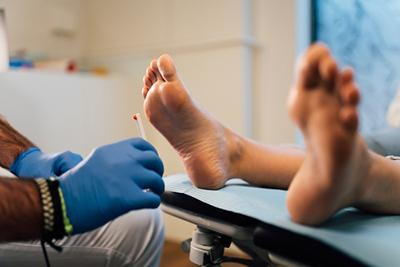Diabetic Foot Care: Importance, Tips, and Warning Signs

- posted: Apr. 08, 2024
When you’re dealing with diabetes, you may understand that one of the most important things you can do is care for your feet. For individuals living with diabetes, proper foot care is essential for maintaining overall health and preventing complications. Diabetes can increase the risk of foot problems such as neuropathy, poor circulation, and foot ulcers, which, if left untreated, can lead to serious infections and even amputations. Because of neuropathy and poor circulation, issues like cuts and wounds can go unnoticed and lead to serious complications, making foot care an important part of your life with diabetes.
Foot Care and Diabetes
People with diabetes are prone to foot complications due to nerve damage and poor blood circulation. These issues can lead to decreased sensation in the feet, making it difficult to detect injuries, blisters, or ulcers. Additionally, reduced blood flow can then impair the body's ability to heal wounds, increasing the risk of infections and other complications. Because of this, proper foot care is crucial for preventing serious complications and maintaining mobility and quality of life.
You must inspect your feet thoroughly every day for any signs of redness, swelling, blisters, cuts, or sores. Use a mirror or ask a family member for help if you have trouble seeing the bottom of your feet. You should also wash your feet daily with lukewarm water and mild soap, and dry them carefully, especially between the toes. Moisturize your feet with a gentle lotion to prevent dry skin but avoid applying lotion between the toes to prevent moisture buildup.
Be sure that you’re trimming toenails straight across to prevent ingrown toenails. If you have difficulty doing this, you can visit your podiatrist to have them cut your nails for you. Be sure to choose well-fitting, supportive shoes with a wide-toe box and cushioned soles to reduce pressure and friction on your feet. Avoid high heels, tight shoes, and sandals with open toes, as they can cause rubbing and irritation. You should also always wear clean, dry socks that are moisture-wicking.
Issues to be aware of with diabetic feet include:
- Numbness or pain in the feet
- Sores and ulcers that don’t heal
- Changes in skin color
- Swelling or redness
- Ingrown toenails
Contact Our Podiatrist Today
Make sure you’re taking care of your diabetic feet. Contact your podiatrist to learn more about the importance of diabetic foot care.





